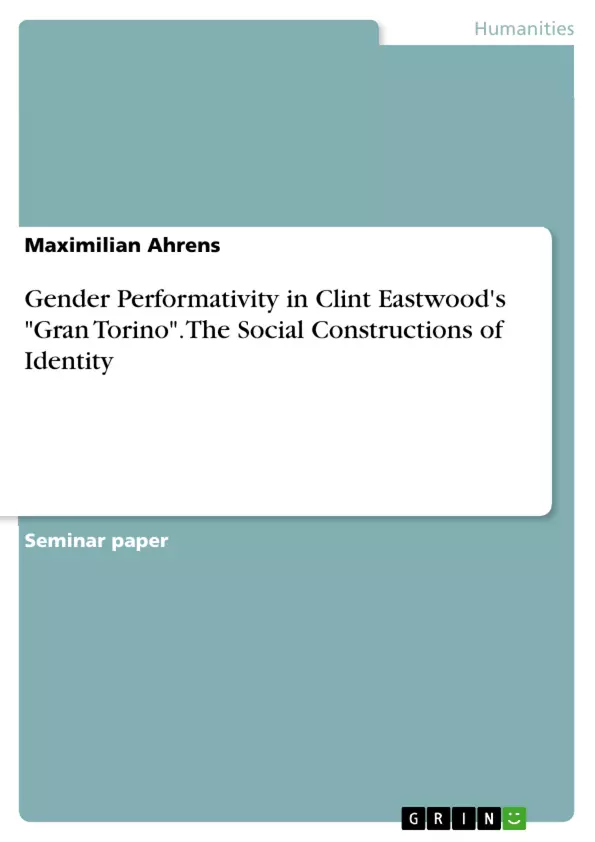To examine how Gran Torino mirrors the discourse on gender identity and how it shows a conservative take on a masculinity crisis, this paper will analyze the movie based on popular positions concerning the topic.
In the confines of his movies’ narration, Eastwood’s portrayal of men and what it tells the viewer about how a man has to behave remained unreflected for most of his career. His iconic depictions of tough male characters could in a sense be interpreted as some of the only resilient entities navigating through uncertain, everchanging America.
In Gran Torino, at the age of 78, we find Eastwood patrolling a newfound border: He tackles and questions the concept of masculinity that defined his career.
Inhaltsverzeichnis (Table of Contents)
- Introduction
- Judith Butler's concept of gender performativity
- Critique of Judith Butler's theory
- Gran Torino Synopsis
- Gran Torino and gender performativity
- Conclusion
Zielsetzung und Themenschwerpunkte (Objectives and Key Themes)
This paper aims to analyze the film Gran Torino through the lens of gender performativity, specifically examining how the film reflects conservative perspectives on masculinity and the alleged masculinity crisis. It will draw on the work of Judith Butler and Slavoj Žižek to develop a critical framework, and contrast these perspectives with those of contemporary conservative thinker Jordan Peterson.
- Gender performativity and its implications for understanding identity
- Conservative perspectives on masculinity and the "masculinity crisis"
- The film's portrayal of masculinity and its potential contradictions
- The role of cultural context and societal norms in shaping gender identities
- The interplay between conservative and postmodernist views on identity and performance
Zusammenfassung der Kapitel (Chapter Summaries)
- Introduction: This chapter introduces the film Gran Torino and its reception, emphasizing Clint Eastwood's portrayal of masculinity in his career and the film's examination of masculinity in a contemporary context.
- Judith Butler's concept of gender performativity: This chapter delves into Judith Butler's theory of gender performativity, which challenges the distinction between sex and gender and argues that gender is not an inherent attribute but rather a performance constructed through social practices.
- Critique of Judith Butler's theory: This chapter presents a critique of Judith Butler's theory from a conservative perspective, drawing on the work of Jordan Peterson, who argues that postmodern deconstructionist thought undermines traditional values and societal stability.
Schlüsselwörter (Keywords)
This paper focuses on key terms and concepts such as gender performativity, masculinity crisis, conservative perspectives, postmodernism, identity theory, and the film Gran Torino. It analyzes how these concepts intersect and inform the film's portrayal of masculinity and its critique of contemporary gender discourse.
- Quote paper
- Maximilian Ahrens (Author), 2021, Gender Performativity in Clint Eastwood's "Gran Torino". The Social Constructions of Identity, Munich, GRIN Verlag, https://www.grin.com/document/1061016



